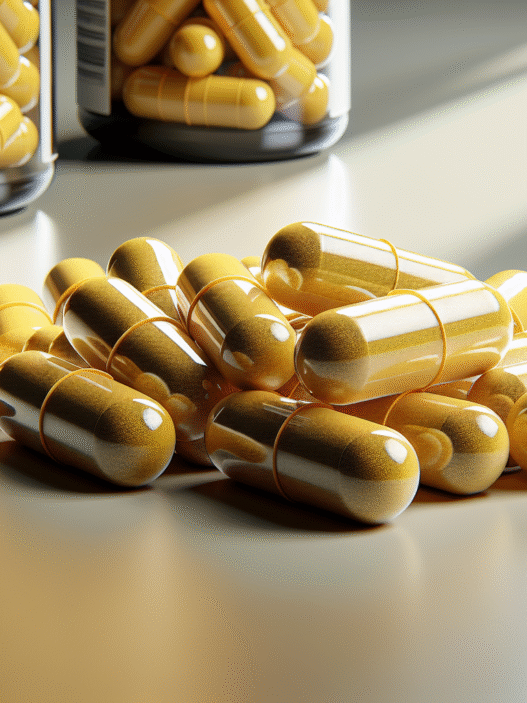Understanding Berberine
Definition and Sources
Berberine is a natural compound found in several plants, including barberry, goldenseal, and Chinese goldthread. It is known for its striking yellow color and has been used in traditional medicine for generations. This compound has attracted attention due to its potential health benefits, including blood sugar regulation, weight loss, and antimicrobial properties.
Berberine can be consumed in various forms, such as capsules, powders, or tinctures, which provide flexibility for individuals seeking to incorporate it into their wellness routines. For more details on foods rich in berberine, visit our article on what foods are high in berberine.
Potential Health Effects
Research suggests that berberine may have several beneficial health effects, particularly in the realms of metabolic health and cardiovascular function. Some of the key potential health effects include:
| Health Effect | Description |
|---|---|
| Blood Sugar Regulation | Berberine has been shown to help lower blood glucose levels, making it a candidate for assisting those with diabetes. |
| Weight Loss | Some studies indicate that berberine may support weight loss by improving metabolism. |
| Heart Health | Research suggests potential benefits for heart health, making it a consideration for those concerned about their cardiovascular well-being (is berberine bad for heart?). |
| Gut Health | There are ongoing discussions about its impact on gut bacteria, with some studies suggesting it may alter the gut microbiome balance (does berberine harm gut bacteria?). |
While these potential effects are promising, it is essential to approach the use of berberine with caution. Its interaction with other medications and overall suitability for certain individuals must be considered. For individuals questioning whether berberine is right for them, especially those with pre-existing conditions, it is advisable to consult a healthcare professional or refer to guidelines on who shouldn’t take berberine?.
It is also worth noting that berberine is not mentioned in the World Anti-Doping Agency’s Prohibited List (WADA Prohibited List), indicating it is not regarded as a banned substance for athletes.
Berberine and Blood Sugar
Berberine, a naturally occurring compound, has gained attention for its potential health benefits, particularly in relation to blood sugar management. It is important for individuals interested in functional medicine and holistic wellness to understand how berberine interacts with blood glucose levels and diabetes medications.
Impact on Blood Glucose Levels
Research has indicated that berberine may lower blood sugar levels. It has been suggested that this compound can enhance insulin sensitivity, aiding the body’s ability to utilize glucose more effectively. Studies show that berberine can lead to a reduction in fasting blood glucose and HbA1c levels, which are critical indicators of blood sugar control.
| Effect | Blood Glucose Levels |
|---|---|
| Fasting Blood Glucose Reduction | Up to 30% |
| HbA1c Reduction | Up to 1.5% |
It’s advised for those considering berberine to monitor their blood sugar closely, especially if they are already taking diabetes medications, as combining berberine with these medications might cause blood sugar to drop too low (WebMD).
Interaction with Diabetes Medications
Berberine can interact with various diabetes medications, which may enhance their effects. This interaction raises the possibility of hypoglycemia, a condition characterized by abnormally low blood sugar levels. Individuals on diabetes medications should consult healthcare professionals before starting berberine supplementation. The following are common diabetes medications that may interact with berberine:
| Medication Type | Interaction |
|---|---|
| Metformin | Increased glucose-lowering effect |
| Sulfonylureas | Higher risk of low blood sugar levels |
| DPP-4 Inhibitors | Possible enhanced efficacy |
For those who are curious about the implications of combining berberine with other medications or the potential risks involved, further insights can be found in our article on is there a downside to taking berberine?.
In summary, while berberine shows promise in managing blood sugar levels, caution is warranted when combined with diabetes medications due to potential hypoglycemia. It’s essential to stay informed and engage with healthcare professionals when considering this supplement.
Berberine and Blood Pressure
Influence on Blood Pressure
Berberine has been shown to potentially lower blood pressure, making it a subject of interest for those managing hypertension. Its ability to influence blood pressure can be beneficial for some individuals; however, it raises important considerations for those already using medications to manage their blood pressure. According to information from WebMD, individuals taking berberine should monitor their blood pressure closely to avoid potential complications.
| Blood Pressure Impact | Description |
|---|---|
| Decrease | Berberine may lead to lower blood pressure levels. |
Complications with Blood Pressure Medications
When taken in conjunction with medications that also lower blood pressure, berberine could result in blood pressure dropping too low. This can pose serious health risks, particularly for individuals who rely on medication to maintain safe blood pressure levels. It is crucial for individuals considering berberine to consult healthcare professionals to discuss their current medications and health conditions.
| Potential Risk | Description |
|---|---|
| Hypotension | Combining berberine with blood pressure medications may cause excessively low blood pressure. |
For those who are interested in understanding the broader implications of berberine on heart health, it may be helpful to explore whether berberine is bad for the heart or to check for any downsides of taking berberine. Always prioritize safety and professional guidance when adding new supplements to a health regimen, especially those that affect blood pressure.
Berberine and Blood Clotting
Berberine has garnered attention in the health community for its potential effects on various bodily functions, including blood clotting. Understanding how berberine interacts with blood clotting mechanisms is essential for those considering its use, especially alongside certain medications.
Effects on Blood Clotting
Research suggests that berberine may slow down blood clotting. This can potentially be beneficial for some individuals, particularly those who may need to manage their blood flow. However, the effects can also lead to an increased risk of bruising and bleeding if taken improperly. For example, when berberine is consumed, it can inhibit certain clotting factors in the body, which may affect overall coagulation processes.
| Blood Clotting Effect | Description |
|---|---|
| Slowing of Clotting | Berberine may inhibit various clotting factors, which can lead to a slower clotting response in the body. |
Risks when Combined with Clotting Medications
For individuals taking medications that also slow blood clotting, the combination with berberine can heighten these effects. This increased synergy may elevate the risks associated with bruising and severe bleeding. It is crucial for those on anticoagulant or antiplatelet medications to consult healthcare professionals before introducing berberine into their regimen.
| Combination | Risk |
|---|---|
| Berberine + Anticoagulants | Increased risk of bruising and bleeding due to compounded effects on clotting processes. |
| Berberine + Antiplatelet drugs | Similar heightened risk of excessive bleeding. |
Given the potential implications of combining berberine with clotting medications, it’s essential for individuals to stay informed about who shouldnt take berberine and consult resources such as the Mayo Clinic’s insights on berberine to understand its effects fully. This knowledge helps ensure safe usage while maximizing potential health benefits.
Berberine and Medication Interactions
Understanding how berberine may interact with certain medications is crucial for ensuring safe and effective use. This section focuses on its interactions with two specific drugs: cyclosporine and dextromethorphan.
Cyclosporine Interaction
Berberine may impact the metabolism of cyclosporine, a medication often used to prevent organ transplant rejection and treat autoimmune conditions. Research suggests that berberine might decrease the speed at which the body breaks down cyclosporine, potentially leading to increased effects and side effects from this medication (WebMD).
| Interaction | Potential Effect |
|---|---|
| Berberine + Cyclosporine | Increased effects and side effects of cyclosporine |
Patients taking cyclosporine should consult their healthcare provider before adding berberine to their regimen to avoid any adverse reactions.
Dextromethorphan Interaction
Similarly, berberine might influence the effectiveness of dextromethorphan, a common cough suppressant found in many over-the-counter medications. Like cyclosporine, berberine could slow down the breakdown of dextromethorphan in the body, which may increase its effects and side effects (WebMD).
| Interaction | Potential Effect |
|---|---|
| Berberine + Dextromethorphan | Increased effects and side effects of dextromethorphan |
For individuals using dextromethorphan, it is advisable to discuss the use of berberine with a healthcare professional to mitigate any risk of heightened side effects.
In summary, interactions between berberine and medications such as cyclosporine and dextromethorphan create a potential for increased effects and side effects. Understanding these interactions is essential for anyone considering berberine as a supplement. For more insights on the safety and potential downsides of berberine, explore our article on is there a downside to taking berberine?.
Berberine and Weight Loss
Claims and Evidence
Berberine has garnered attention for its purported effects on weight loss, leading some to claim it is the “key to weight loss” or even “Nature’s Ozempic.” However, the evidence supporting these claims is limited and uncertain. Studies have shown that some individuals may experience slight weight reduction after taking berberine, particularly in small-scale trials involving diseased individuals. One such study indicated an average weight reduction of approximately 0.84 kg (almost 2 lbs.) after 18 weeks of treatment. Yet, when low-quality studies are excluded, this reported weight loss benefit disappears entirely (OPSS).
Overall, the scientific community has yet to establish clear evidence supporting the use of berberine specifically for weight loss. Further research is necessary to determine its efficacy and to understand its potential role in weight management.
| Study Characteristics | Average Weight Loss (kg) |
|---|---|
| Small studies (including non-U.S. diseased individuals) | 0.84 |
| Excluding low-quality studies | No significant weight loss |
Safety Concerns
The safety of long-term berberine use raises questions among both researchers and health practitioners. As there is insufficient evidence to conclusively establish berberine as an effective weight-loss supplement, concerns about its long-term safety persist. The potential risks associated with prolonged use include adverse effects on gut health and interactions with other medications (is there a downside to taking berberine?).
Moreover, it is vital for individuals contemplating berberine for weight loss to consult healthcare professionals, especially if they have existing health conditions or are taking other medications. Understanding the possible side effects and interactions is crucial to ensure a safe approach to incorporating berberine into a wellness regimen. Those interested in this area can explore more about the potential drawbacks and implications of berberine through our article on who shouldn’t take berberine?.
The overall conclusion regarding the use of berberine for weight loss, alongside the safety concerns, is that consumers should proceed with caution and seek guidance from trusted healthcare sources.





















